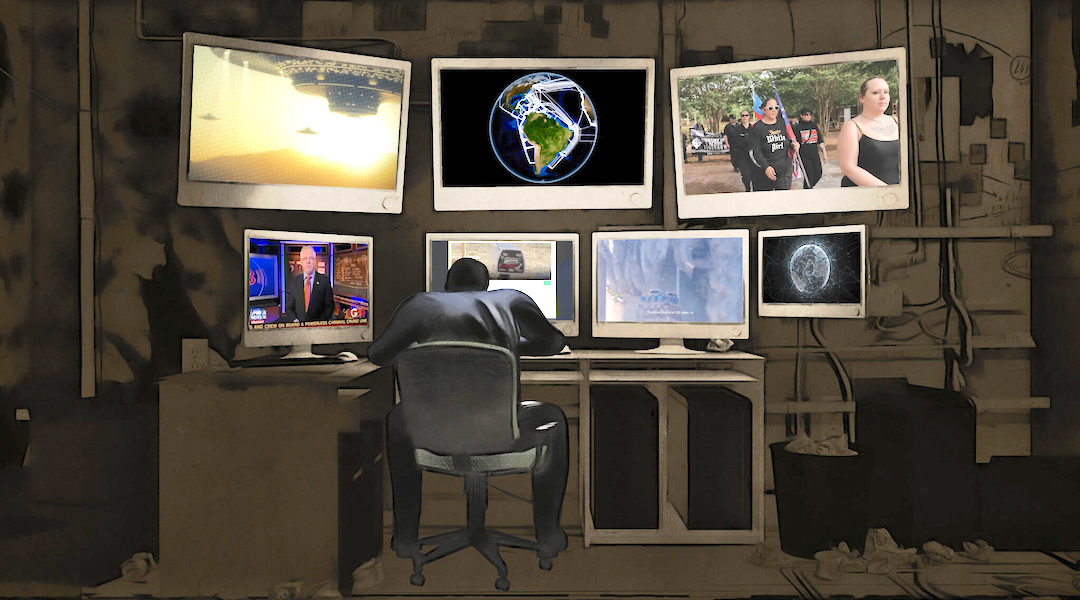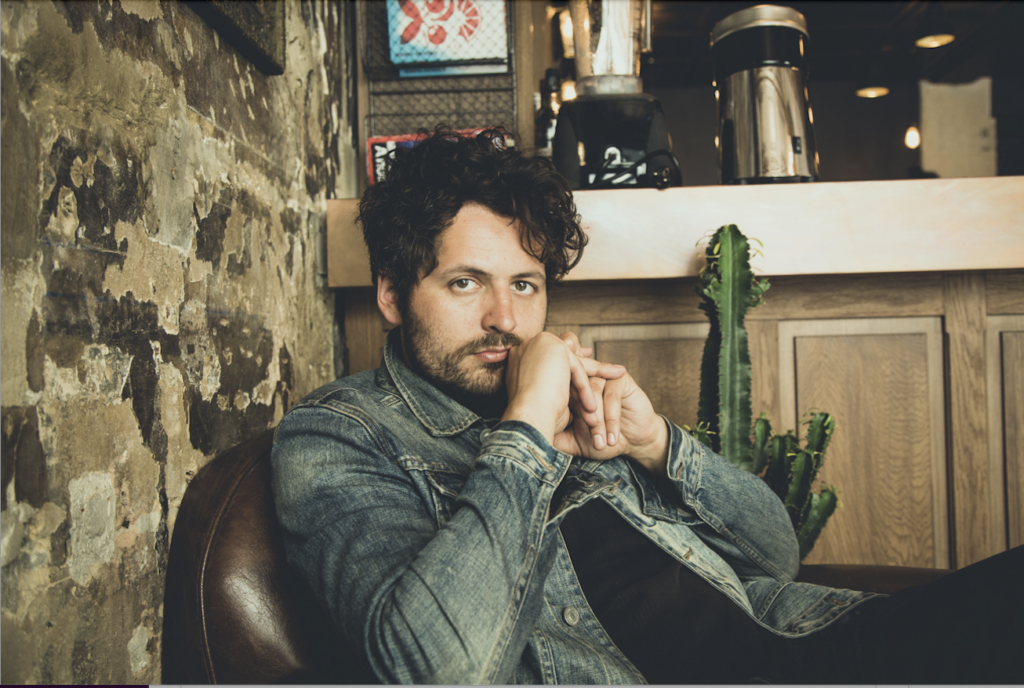A fascinating new documentary shows how antisemitic lies were the ‘original fake news’
‘The Conspiracy’ director Maxim Pozdorovkin on why the myth of Jewish control is so durable

A scene from “The Conspiracy.” Courtesy of Sadie Productions, animation by Dasha Bough
“The Conspiracy” will play as the closing night film of DOC NYC on Nov. 17. More information and tickets can be found here.
At the beginning of the 19th century, the Oldest Hatred added a new innovation.
Amid the aftershocks of the French Revolution, many Jews gained civil rights, and with the anxiety of a liberalizing Europe, accounts began to spread of secret meetings in the Old Jewish Cemetery in Prague. An influential letter claimed that the “Hebrew sect” was controlling the Jacobins and Freemasons. Jews, once marginalized and vilified on theological grounds, were, with emancipation, held up as master manipulators.
Within a generation or two of their new freedoms, three Jewish families with nothing in common would be implicated in the alleged conspiracy, and, soon after, countless more would be murdered in its name. The libel is still with us, and shows no signs of abating.
“Antisemitism’s about a bad idea — an intellectually stupid idea that’s also a toxic lethal idea that’s been disastrous” said Russian-American director Maxim Pozdorovkin, whose new animated documentary, “The Conspiracy,” chronicles the development of canards about secret Jewish control.
Following the Warburg banking family from Germany, the Bronsteins of Ukraine (you may recall Leon, who rebranded as Trotsky) and the Dreyfuses of France, Pozdorovkin demonstrates the human toll of baseless libels. More remarkably, he reveals the true conspiracy at work: not between Jews, but between people like Henry Ford and lesser-known polemicists who worked to frame them as interlopers in world affairs.
With a voice cast including Liev Schreiber, Lake Bell and Jason Alexander, Pozdorovkin dramatizes how the myth metastasized, drawing a direct line from “The Protocols of the Elders of Zion” to today’s posts on Gab.
I spoke with Pozdorovkin to learn how “The Conspiracy” took shape. The following conversation has been edited for length and clarity.
How did you land on the idea of exploring this topic through three families?
I wanted to pick three families that would both get at the core of this conspiracy theory and also destroy it from the inside. People who could not be more different, had no connection, had never met. I saw they were actually quite prophetic about the dynamics of the conspiracy being woven around them. Trotsky had one of the earliest completely sober assessments of Hitler that I’ve seen in history. The Warburgs, much more so than the Rothschilds, were the prototype for this sort of Soros, Mike Bloomberg myth that exists today. I realized that they were so central and kind of largely forgotten. The notion of a certain kind of international Jewish cooperation was so embedded in this family precisely because they were split between New York and Germany and involved in finance.
You didn’t want to use talking heads and you had primary sources from some people we don’t have many photographs of. Is that how you ended up animating it?
There’s almost this kind of polysemous nature, where the archives and the animated world are bleeding into one another. And so this style of somewhere between 2D and 3D really came about from that. And also, I could use a lot of visual references from the era where things were happening. So for example, the German sections tend to be a little bit more German expressionist in the way that some of the architecture’s done, some of the posing.
You’ve made films that are about propaganda and misinformation before, notably “Our New President,” about the Russian coverage of Trump’s presidency. Do you see a connection between the mechanism of that sort of propaganda on Russian TV today and the “Protocols” and their spread? Obviously, we know that Russia played a big part in that as well.
The work of propaganda was so huge. This kernel of some sort of scheming group is this kind of original piece of fake news. Especially during times of political turmoil and institutional collapse, people will turn to conspiracy theories. Moreover, the people who have a faltering grip on power during these kinds of transitional moments, they will weaponize conspiracy theories. And that’s what we see in Russia. I think that that’s what we see with the right wing in the U.S. But ultimately, as those groups become much more marginal, they’ll reach for conspiracy thinking, which is a certain kind of associative thinking premised on not truly being able to figure out the truth through analytic means.
Around the ’20s, and the ’30s, antisemitism was referred to as “the socialism of fools,” or “idiots.” For new citizens that were having rights and coming to understand various exploitative labor practices, they would gravitate towards socialism. For the ones who had difficulty dealing with those more abstract structural levers that created their life, it was much easier to blame a group: Enter the Jews. A lot of times when people including Jews, will talk about antisemitism, they’ll be like, “well, what is it about the Jews?” And while there’s some answers to that question, to me, it’s a bit puzzling because it accepts the premise of an antisemite. If we’re going to try to undo that history of lies, you have to introduce the social turmoil and the fanatics who were using conspiracy theories to cover their own ass, to advance their own career, or who were ideological — there were always people exploiting the gullibility of masses.

We’ve reached a new frontier with Kanye West and this uncoded antisemitism, which obviously is getting him in trouble, whereas someone like Doug Mastriano is sort of hiding behind these buzzwords. After spending so much time working on this, what do you make of this development?
If you look at any conspiracy theory, the central predicate of all of them is that there’s a secret group that’s basically hiding the truth, and then manufacturing through various layers of complexity, an alternative truth that the rubes believe. It’s kind of remarkable if you think about it. In some cases, it’s plausible. In other cases it’s just borderline idiotic to even think that any kind of planning on that scale could ever take place.
One of the most dangerous things about conspiracy theories now is that people who have no idea or have no education and really shouldn’t be speaking on a matter can gain a certain kind of authority. Before you had to do some reading or have at least a grasp of certain historical processes with conspiracy theories. The reason I started out the film bringing in all the other conspiracy theories is that people who are of that mindset are already there throughout the core belief, and so it’s very, very easy to attach ancient prejudice to that belief. And that’s what you see in those Goyim TV people who did the LA freeway.
I wouldn’t have thought to cast Liev Schreiber as Trotsky.
I actually wanted Liev from the very beginning. With Dreyfus, there’s one audio recording, but no one’s ever really heard it. And with Warburg, I think no one’s ever heard his voice. At least some people know that Trotsky had a kind of histrionic voice, and we were thinking of even using more archival recordings. But given the fact that I knew that the film was told reflectively using his memoir, I wanted to try to find this more internal peaceful voice to play against some of the gesticulation.
We recorded Liev’s performance, I believe in January, right before a war broke out. I had known Zelenskyy a little bit before the war, mostly through television, but there’s something in this kind of calm, measured style and approach that Liev brought to the role that reminds me of this kind of beautiful courage that Zelenskyy has demonstrated since then. And I know Liev’s also been very involved with helping Ukraine.
The people who most need to see this film might be the least likely to be convinced by it. How are you hoping this gets out and can change minds? Obviously some are going to say this is just another thing from the Jewish media.
That’s an issue almost with all liberal media. I made a film for HBO called “The Truth About Killer Robots,” which really teases a lot of the sci-fi tropes as a way of drawing in people who are often most enthusiastic about technology, and therefore the most blind to its philosophical implications or potential for societal problems that technology creates. I think by not choosing to have talking heads that are sort of explaining to you, you create a narrative in the words of the people that lived them and also foreground this notion that it is about conspiracy theories. That it is about a conspiracy as a way of potentially getting people to start watching and to reflect on it.
My hope is that this film has a trickle-down effect. I don’t want the film to feel like I’m convincing you of anything. That’s the false move. People don’t like to be addressed in that way. Let’s just lay out the narrative in this way and see what you can take away from some of these patterns.
























